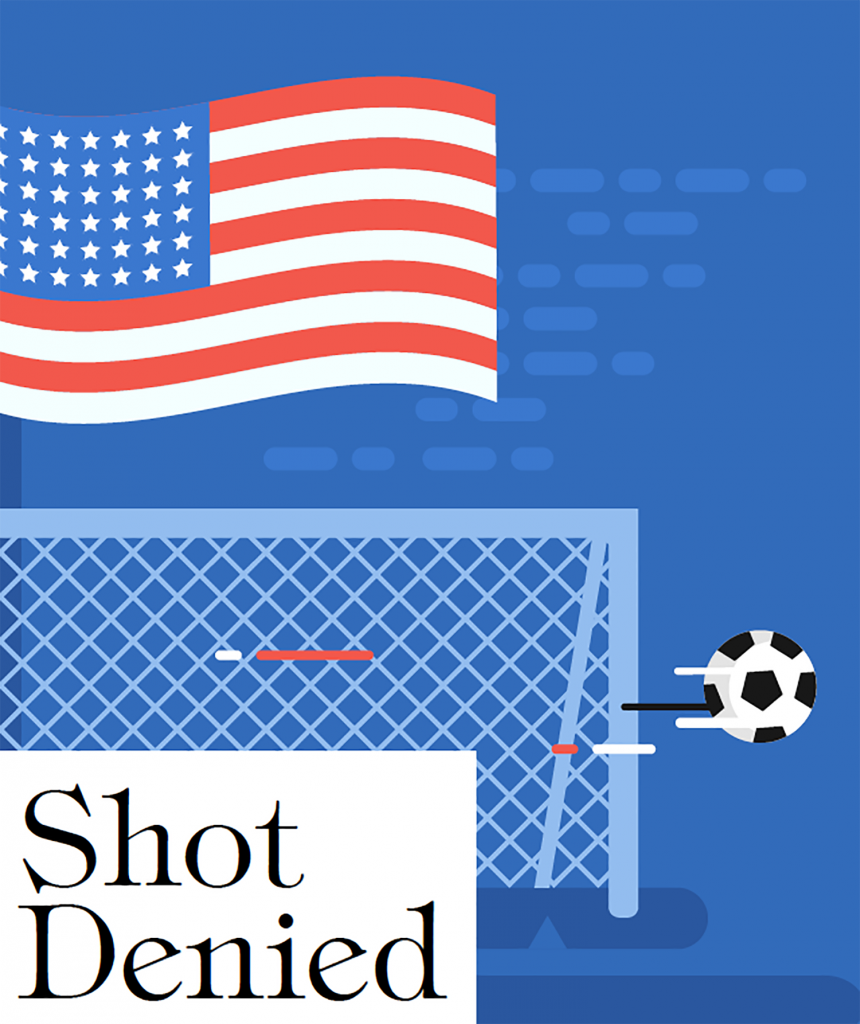
WAKE UP. Not in a nice way, but in a mean, cruel world-out-to-get-you way.
On October 10 at about 10 p.m., the cruelest wake-up call this side of a bucket full of ice and water doused the United States Men’s Soccer Team.
You know the team. It’s the one lots of people in the U.S. rally around once every four years when they reach the World Cup, play the role of plucky underdog and sometimes score a big win.
And then just as quick as the pomp and circumstance gets started and we’re readying the confetti cannons to celebrate a deep run in the World Cup, reality appears in the form of a loss. This time, the tiny nation of Trinidad and Tobago saved us all from this fate by beating the U.S. men and eliminating them from World Cup qualifying.
Removed. Gone. Bye-Bye.
For those poor U.S. soccer fans who booked their tickets to Russia, well I hope there is a good refund policy, because for the first time since the 1986 World Cup in Mexico, the U.S. won’t have a team at the biggest event in soccer.
Imagine Alabama, Georgia, Tennessee or Florida losing a couple of key games late this season and then being told they won’t be eligible to play in the College Football Playoff again until 2021.
Sounds ridiculous, right? It is for college foot- ball. But international soccer’s version of the college football playoff, the Super Bowl or the Big Dance stands as the World Cup, and it only plays once every four years.
The U.S. men won the Gold Cup this summer. Watching an early-round Gold Cup game, I penned a column for V3 talking about all that is wrong with the men’s national team. Instead of submitting it, I wrote about something else.
But all of the points I made in the column, which didn’t see the light of day, were on display in spades on October 10. The U.S. men looked lackadaisical at best. No effort. Weird coaching and position decisions haunted the team.
And against an opponent the U.S. should roll with ease, they acted and played as if the game had no meaning. It’s hard to feel sorry for any of those players. Yes. Some played hard, but the effort wasn’t there. Neither was the fire.
Lionel Messi and Argentina found themselves in a must-win qualifying game. Messi delivered with a hat trick against a tough opponent in bad conditions. The U.S., well the conditions were bad and their play was even worse.
Unlike their female counterparts, who have won three World Cup titles, the U.S. men rarely enter games against good teams as the favorites. Honestly, I enjoy watching the U.S. Women’s team more. Not because they win far more often,
but because they play a better brand of soccer.
But I digress, everyone knows the women’s team sits as one of the favorites, and the men rarely
enter the conversation. Performances similar to what we got to see on October 10 remain the norm more than the exception.
Over the past three World Cups, the U.S. men have won two matches but managed to reach the knockout rounds twice thanks in part to four draws. Not since the mighty 2002 squad reached the final eight before losing to Germany in the phantom handball game has the U.S. squad shown the fervor, zeal and excitement required to possibly be
considered on par with the world’s best.
In other words, that team showed everything the current squad didn’t. They didn’t shy away from good squads and took the fight to some of the best teams in the world. And they fought hard when they had to have a win, instead of phoning the effort.
A few years ago several friends heard me dis- cussing the men’s soccer program and asked a pointed question.
“Do they have a legitimate chance to win the World Cup?”
My answer was easy.
“No, but that doesn’t mean they aren’t good.”
I pointed out that Georgia rarely has a chance to win a national title either, but they still cheer for the Dawgs. That didn’t go over well no matter how true it was.
U.S. Soccer will probably clean house and hopefully come up with a coach and a staff that can find ways to utilize our talent to make the squad more relevant on the world stage.
Those familiar with the U.S. men’s program can point to quarterfinal appearances by men’s squads in the U17 and U20 World Cups this year. A new coach, maybe a new president of U.S. Soccer combined with what appears to be a solid talent pool could work wonders for the U.S.
Odds are the 2026 World Cup will be hosted with a joint effort from the United Sates, Canada and Mexico. By then the players on the U17 and U20 teams should be in their prime.
Honestly, the U.S. wasn’t on a path to soccer dominance and may not ever be, but U.S. Soccer has the opportunity to capitalize on one of the darkest moments by bringing in new coaches and new attitudes.
Can those things combined with the talent mean a deeper run at the World Cup or more international prominence? Possibly, and we all know now it can’t get any worse.
And maybe, just maybe, come 2022 and 2026 we’ll look back at October 10, 2017 and realize the wake up call was exactly what the U.S. men’s program needed no matter how much it hurt.



